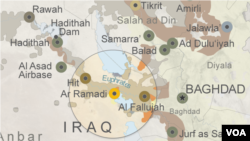U.S. military officials said coalition airstrikes are having "a profound effect" on Islamic State militants in Iraq and that the coalition is "taking the enemy off the battlefield in significant numbers."
Lieutenant General John Hesterman, chief of the air campaign, told reporters Friday at the Pentagon that he doesn't believe the Islamic State group is making major advances around Iraq.
"Every now and again they make a tactical advance and then we play it like a strategic victory and it’s not," Hesterman said.
U.S. Deputy Secretary of State Antony Blinken said Wednesday the military operation against the Islamic State group has killed more than 10,000 militant fighters in less than a year.
Hesterman agreed that the military operation is taking IS fighters off the battlefield at a "great rate" but said efforts like stopping the flow of foreign fighters may be more significant.
Civilian deaths
The coalition has not seen evidence of civilian casualties in a town in northern Iraq that was targeted by a coalition airstrike on Tuesday, Hesterman said.
Witnesses of the strike on Hawija have said it flattened an entire neighborhood and killed dozens of civilians.
Hesterman said the U.S. dropped a very small weapon on a bomb-making factory and what was inside led to massive secondary explosions.
"Let's be clear, what did the damage was the huge amount of high explosives of gas intended to turn into murderous weapons to kill Iraqi forces and innocent civilians. If there are unintended injuries, that responsibility lies squarely on Daesh [Islamic State]," he said.
The explosions that followed Tuesday's strike destroyed much of the surrounding area; many buildings were reduced to rubble.
Local witnesses told the Reuters news agency that as many as 70 people were killed.
Hesterman, however, said coalition forces have had "historically low" civilian casualties during its operations.
The coalition has targeted several militant bomb factories since the group began using the suicide bombers as a battle tactic. At least one of these caused the death of civilians, including children.
Targeting is 'disciplined' process
The United States began leading a campaign of airstrikes against Islamic State targets last August as Iraqi ground troops attempted to push back a land grab by Islamic State militants.
A month later, the coalition expanded to bombing sites in neighboring Syria.
Those airstrikes, an average of 14 per day, have helped pro-government forces in Iraq reclaim some areas, but the militants have made gains, including seizing the western Iraqi city of Ramadi last month.
Hesterman said that targeting the airstrikes is a "very disciplined” process," because the terrorists have wrapped themselves around the civilian population.
“You have to unwind them from the population and kill them when you can. ... With this enemy we have to be available 24/7 with coalition air power, differentiate them from the population and go after them every time we find them.”
He called it “an order and magnitude more difficult than what we've done before."
VOA National Security Correspondent Jeff Seldin contributed to this report.





